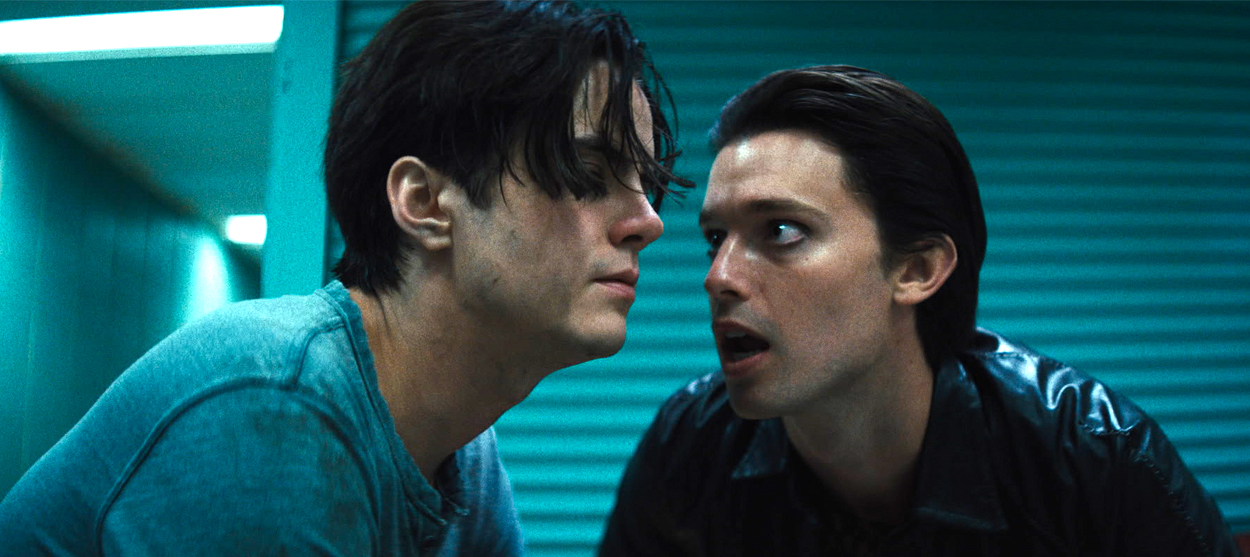The best horror film of 2019 is secretly about toxic masculinity
What Daniel Isn't Real gets right about the demons of manhood


A free daily email with the biggest news stories of the day – and the best features from TheWeek.com
You are now subscribed
Your newsletter sign-up was successful
Everyone knows, or at one time in their life has known, a toxic man: Maybe cruel or violent, entitled or selfish, or simply obnoxious with neither a filter nor self-awareness. This man could be a relative, like a father or uncle, or a coworker, a casual acquaintance, or even a dear friend. He could even be imaginary.
Daniel Isn't Real, director Adam Egypt Mortimer's latest film, goes with the last option. As a child, protagonist Luke happens upon the gory aftermath of a mass shooting. He is shaken from his stupor by a boy named Daniel, who materializes out of nowhere. No matter. The boys play and bond and escape life's doldrums together, until Daniel's mischief nearly grows fatal and Luke's mother persuades him to imprison Daniel in a dollhouse. Years later as a solitary, melancholic adult, Luke (Miles Robbins) decides to spring Daniel (Patrick Schwarzenegger) from his toy dungeon, and they once again play and bond and have a handful of good times, especially with Luke's new crush Cassie (Sasha Lane). But of course, there are perils to having a figmental best friend — especially when your figmental best friend is as noxious as Daniel.
Mortimer understands that the concept of "toxic masculinity," the very idea of that toxic man, is worn out beyond repair; if any bad actions a man takes qualifies as "toxic," then nothing is actually toxic. Indeed, the words "toxic masculinity" no longer do enough to examine toxic behavior, because that behavior create such a broad spectrum that two words alone become insufficient for discussing them.
The Week
Escape your echo chamber. Get the facts behind the news, plus analysis from multiple perspectives.

Sign up for The Week's Free Newsletters
From our morning news briefing to a weekly Good News Newsletter, get the best of The Week delivered directly to your inbox.
From our morning news briefing to a weekly Good News Newsletter, get the best of The Week delivered directly to your inbox.
Daniel Isn't Real never mentions toxic masculinity at all, but it does invoke on screen the traditional understanding of what toxic male conduct looks like. For guys like Luke, friendship offered by a guy like Daniel is a godsend. Daniel is everything Luke isn't: He's decisive, self-possessed, charismatic, sexual; boil that down to one word and that word is "fun." Men are taught from an impressionable age that to be a man is to be confidently virile, the life of the party, available on a surface level but otherwise unattainable. It's easy picturing the euphoric heights a night's partying with Daniel could reach. Mortimer indulges that euphoria, too, though perhaps only men in his audience will truly connect with the debauched bedlam Luke gets up to under his friend's influence. They carouse. They prank Luke's roommate. They even get in the sack with a woman named Sophie (Hannah Marks) through effortless acts of seduction.
It's a male dream come true. But as much as Daniel aids Luke in seducing women, he seduces Luke, too. That's the toxic man's power. He can bend his toxicity to fulfill his own wants and needs, but he can also use it to influence the men around him. Daniel spreads not a poison but a disease, as if he's a carrier for the worst instincts known to the masculine gender and Luke is patient zero — because, remember, Daniel isn't supposed to be real. He's in Luke's head.
Except there's more to Daniel's nature than meets the eye: Turns out he very much is real, not a fantasy, but a wicked spirit who for centuries has, in his words, helped people, solved their problems, and given them visions, "and no one's deserved any of it." Framed this way, Daniel Isn't Real becomes more profound and "toxic masculinity" becomes even more outmoded as a phrase; Daniel has shaped cultural mores for so long that his manipulative ploys are foundational. They're the fabric of society rather than injected venom.
Mortimer cuts to the heart of Daniel's specifically virulent form of brutality, suggesting that beneath his enmity and his will to dominate lies bitter resentment and not a small amount of isolation. "He's weak, he's lonely, and he's nothing without me," Daniel snarls in an encounter with Luke's therapist, Dr. Braun (Chukwudi Iwuji). Maybe he has a point. Without Daniel, Luke has no drives. On the other side of that coin, without Luke, Daniel has no restraints. If Luke and Daniel are psychically entwined, that means sensitivity — Luke's most admirable asset, suppressed by depression and trauma though it may be — keeps Daniel in check, whereas Daniel's amoral brute puts Luke's loved ones in harm's way.
A free daily email with the biggest news stories of the day – and the best features from TheWeek.com
Daniel Isn't Real bears all the pleasures one should expect from a good horror movie; it's grisly, graphic, shot with atmosphere that continues to haunt long after the lights go up, and grows increasingly deranged from minute to minute, culminating in a rooftop sword fight between the id and the superego. Mortimer's blocking is a particular delight; he likes to keep Schwarzenegger at the edges of the frame, a marauding and malevolent force just out of arm's reach but always threatening to strike. He's a shark stalking prey. An equal delight is the dynamic Schwarzenegger shares with Robbins, who, as time goes by, borrows elements of his co-star's performance to augment his own, which is a fancy way of saying that his job is to impersonate Patrick Schwarzenegger. But the beauty of the film lies in that duality. Robbins and Schwarzenegger feed off each other just as Luke feeds off of Daniel, as Daniel feeds off of Luke; they're intrinsically linked, much as the better merits of manhood are linked with its worst.
Mortimer's message here isn't "not all men." Rather, it's "all men," meaning that any man, under the right (or wrong, strictly speaking) influence, can become "toxic," and that "toxic masculinity" does a disservice to the demons of manhood — literal demons, as it concerns Daniel Isn't Real. Horror movies always capture the social and the political fears of their day; today, those fears wind back to what masculinity means at a time when male rule is rightly under interrogation. 2019 hasn't been an especially strong year for horror, but with Daniel Isn't Real, at least it's ended on a high note.
Want more essential commentary and analysis like this delivered straight to your inbox? Sign up for The Week's "Today's best articles" newsletter here.
Bostonian culture journalist Andy Crump covers the movies, beer, music, and being a dad for way too many outlets, perhaps even yours: Paste Magazine, The Playlist, Mic, The Week, Hop Culture, and Inverse, plus others. You can follow him on Twitter and find his collected writing at his personal blog. He is composed of roughly 65 percent craft beer.
-
 How the FCC’s ‘equal time’ rule works
How the FCC’s ‘equal time’ rule worksIn the Spotlight The law is at the heart of the Colbert-CBS conflict
-
 What is the endgame in the DHS shutdown?
What is the endgame in the DHS shutdown?Today’s Big Question Democrats want to rein in ICE’s immigration crackdown
-
 ‘Poor time management isn’t just an inconvenience’
‘Poor time management isn’t just an inconvenience’Instant Opinion Opinion, comment and editorials of the day
-
 Walter Isaacson's 'Elon Musk' can 'scarcely contain its subject'
Walter Isaacson's 'Elon Musk' can 'scarcely contain its subject'The latest biography on the elusive tech mogul is causing a stir among critics
-
 Welcome to the new TheWeek.com!
Welcome to the new TheWeek.com!The Explainer Please allow us to reintroduce ourselves
-
 The Oscars finale was a heartless disaster
The Oscars finale was a heartless disasterThe Explainer A calculated attempt at emotional manipulation goes very wrong
-
 Most awkward awards show ever?
Most awkward awards show ever?The Explainer The best, worst, and most shocking moments from a chaotic Golden Globes
-
 The possible silver lining to the Warner Bros. deal
The possible silver lining to the Warner Bros. dealThe Explainer Could what's terrible for theaters be good for creators?
-
 Jeffrey Wright is the new 'narrator voice'
Jeffrey Wright is the new 'narrator voice'The Explainer Move over, Sam Elliott and Morgan Freeman
-
 This week's literary events are the biggest award shows of 2020
This week's literary events are the biggest award shows of 2020feature So long, Oscar. Hello, Booker.
-
 What She Dies Tomorrow can teach us about our unshakable obsession with mortality
What She Dies Tomorrow can teach us about our unshakable obsession with mortalityThe Explainer This film isn't about the pandemic. But it can help viewers confront their fears about death.
